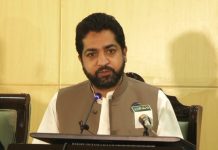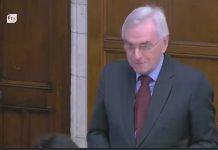A quarterly report by the US Department of Defense claims that Pakistan is still supporting the Taliban and its associated groups, such as the Haqqani network, in Afghanistan. Released on May 19, the report details Pakistan’s involvement as an instigator in the Taliban uprising but also as an arbiter in the US-Taliban peace negotiations.
According to The Balochistan Post news desk, the US Department of Defense has issued its quarterly report for the year 2020 on May 19. The report follows the signing of the agreement between the Taliban and the USA in February for the withdrawal of the US-led international forces from the Afghan soil. The report surveys Pakistan’s involvement in the ceasefire of the two-decade-long Afghan war, but also blames Pakistan for harbouring a soft spot for the Taliban and its accomplices, like the Haqqani network.
“Pakistan continues to harbour the Taliban and associated militant groups in Pakistan, such as the Haqqani Network, which maintains the ability to conduct attacks against Afghan interests,” the report said. Furthermore, the report acknowledges Pakistan role as an arbiter in the peace negotiations but also claims that Pakistan “refrained from applying coercive pressure that would seriously threaten its relationship with the Afghan Taliban to dissuade the group from conducting further violence.”
The Pentagon report asserts that Islamabad’s support of the Taliban is deeply intertwined with its interests in containing its regional archrival, India, and in preventing the spillover of instability from the neighbouring country. “According to the DIA [Defense Intelligence Agency], Pakistan’s strategic objectives in Afghanistan continue to be countering Indian influence and mitigating spillover of instability into its territory,” the report said.
The report further suspects that Pakistan’s support of the Taliban militancy is likely to continue in future as it is conducive to its interests in the region. “Pakistan likely views increased Taliban influence in Afghanistan as supporting its overall objectives and will seek to influence intra-Afghan peace talks in a direction favourable to Pakistan,” the report adds.
These claims stand in direct contrast with the statements made by the Pakistani government. After a telephonic conversation between the Pakistani premier Imran Khan and the US President Donald Trump in April, the Pakistani government claimed the PM has reaffirmed Pakistan’s stance in the facilitation of peace negotiations between the USA and the Taliban. In countless other statements, the Pakistani government has accentuated its role as a stakeholder in the establishment of regional peace in Afghanistan.
Moreover, the past governments have also claimed of exercising “influence” on the Taliban leaders in Pakistan as an act of reciprocation for providing sanctuary to their families. “We have some influence over them because their leadership is in Pakistan and they get some medical facilities. Their families are here,” Pakistani PM’s foreign adviser had told an audience in Washington in 2016.
Balochistan, in particular, has remained a key bastion for the Taliban Militants. Influential Taliban leaders have been known to travel in and out of Balochistan with ease. Mullah Fazel – a top Taliban commander and a senior member of the Taliban negotiation team in Doha – had travelled to Balochistan in March. He had reportedly talked to the Taliban supporters in Pishin on March 25 and expressed his aspiration for establishing an “Islamic Emirate” which would be ruled by the Sharia law. In past, religious outfits, that agree or support Taliban, have also claimed responsibility for numerous attacks on the Hazara community throughout Balochistan.






























